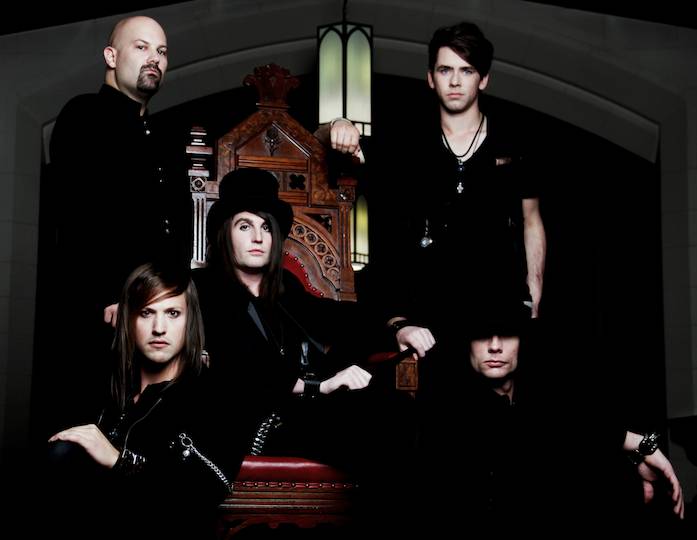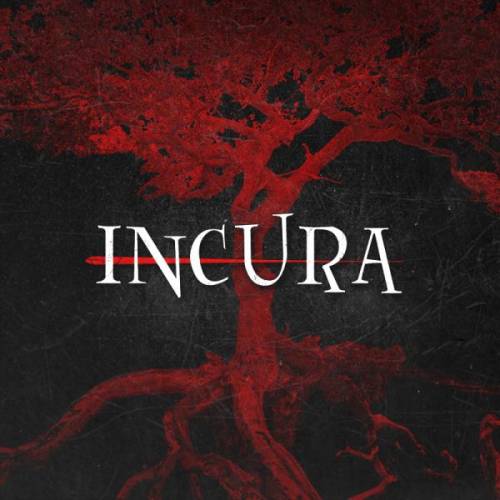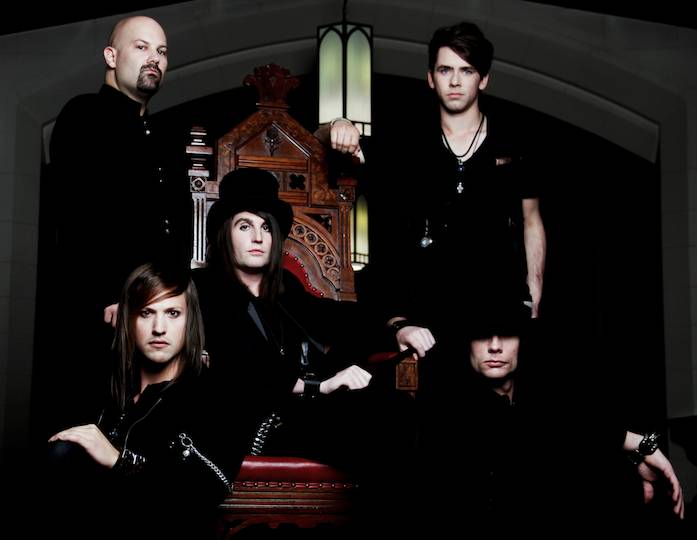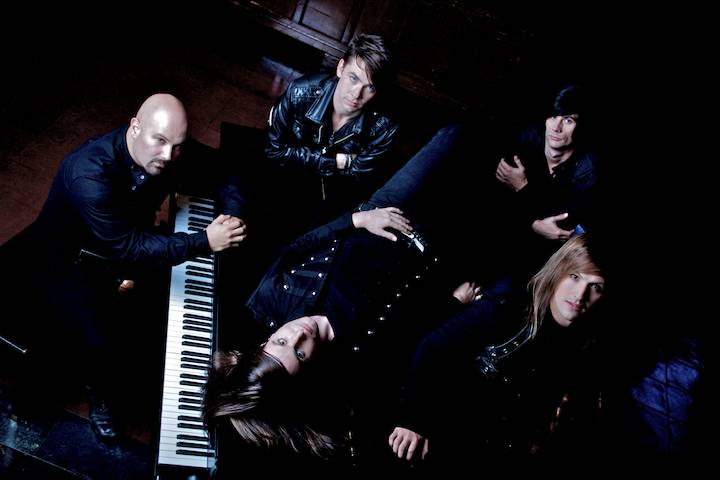Interview: Incura Guitarist Royce Whittaker Talks Debut Album, Influences and More

Canadian theatrical hard rockers Incura released their self-titled debut album February 26 via Coalition Music and Warner Music Canada.
As is evident from the lyric video of the song "Turning Blue" and the music video for “Who You Are," the band brings a refreshing touch of theatricality, which isn't common among rock bands.
I recently caught up with guitarist Royce Whittaker to discuss the debut album and more. Read the conversation below, and check out the band on their official website.
GUITAR WORLD: Your self-titled debut album just came out. How is the band feeling at this point?
For the other guys in the band, it’s been a lot longer of a dream than for me. I just joined the band in September 2012, actually. So what happened there was, I had to fill in for a trip the band was making to Germany, so I had two days to hear the record. Then we went to play for a bunch of publicists, management companies and things like that. So for the band, it’s been a huge journey of going down, working on the record and just being at it for months and months until it’s absolutely perfect. So it’s a big rush and a big feeling to finally have it done and ready.
You said you had a very short time to listen to the album and rehearse. What was that like? Was it a challenge or did you find it easy and natural?
It was a challenge. It’s all pretty theatrical and it’s got to be very animated in a way, so it was a big challenge for me to just learn the record completely by ear, just off of the recordings. There are tons of really intricate parts, and I had the sit down with the keyboard player quite a bit to just work over harmonized leads and things like that. It was a great experience for me, for sure.
Get The Pick Newsletter
All the latest guitar news, interviews, lessons, reviews, deals and more, direct to your inbox!
It’s an epic album with a mix of styles. Where does that combination come from? How does it work?
Everyone in the band comes from a very different background. The singer, Kyle, is very into theater, and he’s a graduated theater student, basically, so that’s where a lot of the operatic stuff comes from, the operatic vocal styles and all of the classical vibes. The keyboard player, Jim, has got a very progressive background with bands like Queen, Rush, Genesis and stuff like that. And then for me, I’m 21 so I’m a bit of a younger cat. I’ve always been into things like Iron Maiden, which I grew up with. So there are lots of blends like that, the really hard theatrical aspect of a metal show and a metal production, combined with vocals that are accessible to everybody and making it just as epic as possible but still listenable.
With these different styles put together, is it harder to develop a fan base? People can be a bit narrow-minded with what they want to listen to.
Yeah, for sure! Even in the short time I’ve been in the band, I’ve already found out it can be tough to put this band on certain bills. We’re almost too soft for the extreme metal crowd, and we’re too heavy for the more laid-back rock crowd. We definitely have to find our niche a little bit, but it’s certainly very well received. Everyone who’s there to experience it really takes something away from it. It’s been really cool for me, to find people being so open-minded to it.
When you’re playing live, does it become difficult to make the guitar stand out among all the epic elements?
I’m the only guitar player, and Jim has all these harmonies and the synth background that really help to fill out the sound, but I need to make sure my guitar sound is just as big as possible, just making sure all the leads stick out and everything. We’re playing together and all working cohesively, but it’s a total challenge to still put on the theatrical rock show while making it look like we’re having a good time and nailing all these parts.
What’s your gear setup for the stage and studio?
I have this rig, which is bigger than what anybody wants it to be [laughs], but basically I have the Mesa Boogie Triaxis; that's my pre-amp sound. So I can use that and dial in tons of different tones and use various settings for each song, so I’m not just using the same patch all the time. I use that with a Mesa 4X12, and I run a GCX ground control system with a GCG major DBX compressor, just to have everything switching all the time. I’m doing a lot of the singing as well, so I just prefer to have the one button switching so that everything is just seamless, and I’m not tap dancing when I’m on stage.
The shows that you’ve played with the band so far — what kind of shows were they?
The first show I did with them was in Hamburg, Germany, for the Reeperbahn festival. It was kind of funny because I flew ahead of the band and they got stuck in Amsterdam overnight, so I was kind of wandering around Hamburg for a night, but it was good to get a feel of things. And then the only show we played was at 2 p.m. at the Canadian National House for German publicists and management companies. There were about 40 people there. It wasn’t open to the public or anything.
With our band, we show up in war paint and try to make it very theatrical, so we were getting a few funny looks when we were walking around, for sure. But the performance itself was just such a great experience. I’ve always really enjoyed playing this kind of music even though I’ve never been in this kind of band before, so getting on stage for the first time and playing the stuff was an amazing experience.
Before joining this band, what were you doing in terms of music?
I’ve playing in touring bands since I was 16. I live in Vancouver, British Columbia, and I have a studio here called Spinnaker Sound. So since I graduated high school, I’ve been on the road with different bands, doing lots of touring. I’ve done a record with another band, but up until this point it’s been basically just the steps I could take to make myself a better player and hopefully get to a different level one day. It’s been great for me to play tons of different genres, like I’ve played reggae for a while, did the pop thing and played in a super-heavy band. So I’ve really managed to get my playing to a very intricate, very disciplined style and being able to play that way has been good for me, and a great learning experience.
Before you joined the band, Incura opened for a few well-known bands like Apocalyptica. In your opinion, which bands would Incura ideally fit with in terms of the musical style?
It’s tough to say! There are lots of different options. At this point, we can see us playing with a lot of European metal bands like Nightwish. I think that would be a really good fit. But honestly, we’re prepared and ready to play to any market, really. It’s not hard for us to walk into a situation that we’re not really comfortable with and try to still be ourselves. We’re waiting to see what happens. We just want to get out there and play with anybody and everybody we can. We definitely won’t say no to anyone [laughs].
What are Incura’s plans for the rest of the year?
We’re going to Canadian Music Week at the end of March, and then right now we’re just working on solidifying a bunch of tours for the rest of the year. We’re hopefully going to be out to Europe again before the year is over, and we’re setting up to do shows in the US as well. So it’s all kind of preliminary and filling in the blanks right now. But we’re definitely going to be out on the road for most of the year, for sure.
Andrew Bansal is a writer who has been running his own website, Metal Assault, since early 2010, and has been prolific in covering the hard rock and heavy metal scene by posting interviews, news, reviews and pictures on his website — with the help of a small group of people. Up till February 2012 he was based in Los Angeles. After that, he had to move to India, but is still carrying on his heavy metal endeavors with the same intensity.




![John Mayer and Bob Weir [left] of Dead & Company photographed against a grey background. Mayer wears a blue overshirt and has his signature Silver Sky on his shoulder. Weir wears grey and a bolo tie.](https://cdn.mos.cms.futurecdn.net/C6niSAybzVCHoYcpJ8ZZgE.jpg)

![A black-and-white action shot of Sergeant Thunderhoof perform live: [from left] Mark Sayer, Dan Flitcroft, Jim Camp and Josh Gallop](https://cdn.mos.cms.futurecdn.net/am3UhJbsxAE239XRRZ8zC8.jpg)






